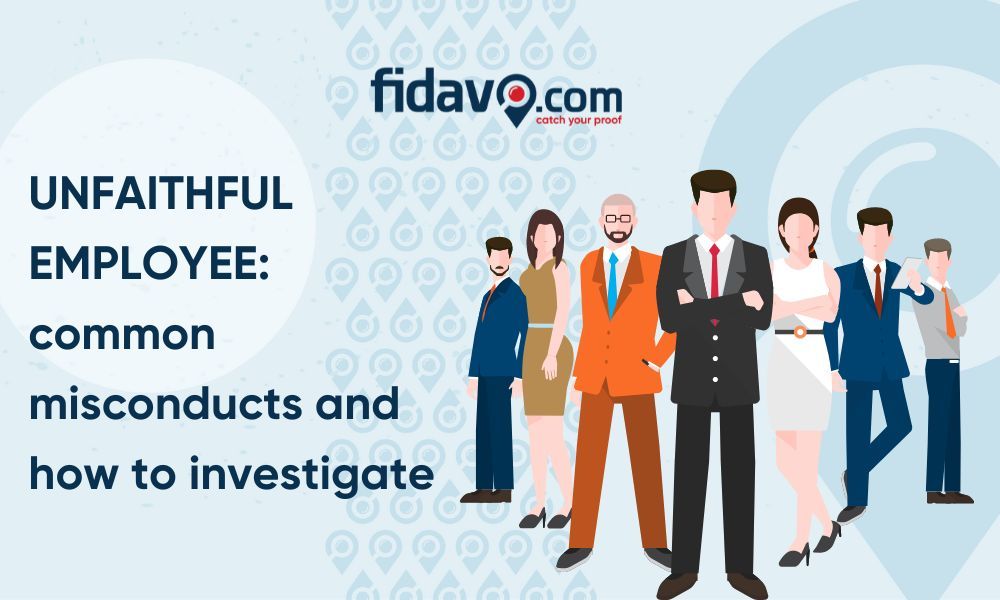Unfaithful Employee: common misconduct and how to Investigate

If you own a business with multiple employees, you may find yourself dealing with unfaithful employees. This unpleasant situation can occur for various reasons in small, medium, and large enterprises, regardless of the industry (such as manufacturing, agriculture, or services).
There are several possible scenarios, but they all revolve around a common thread: the disclosure of confidential information and/or documents of the company to competitors during or after the employment relationship.
To delve deeper into the topic, please continue reading.
What does unfaithfulness of employees mean?
With this term, we refer to the failure to comply with the obligation of loyalty and, upon termination of the employment relationship, the non-competition clause, as provided by the employment agreement (or collaboration agreement) and stated in Articles 2105 and 2125 of the Civil Code.
We can find references to these concepts since 1942 when they were approved (by Royal Decree signed by Vittorio Emanuele III of Savoy) in the current Civil Code.
However, initially, these expressions referred not only to a work agreement but also, primarily, to a pact between individuals. Based on the values of that time, the pact was dictated more by a sense of honor than the desire to protect one's work from competition.
Later on, this terminology was adopted in the professional context, coinciding with the arrival of large multinational companies from overseas. Since the economic boom of the post-war period, cases of corporate infidelity became more frequent and evident, becoming a subject of discussion in contractual negotiations.
Does the conduct of an unfaithful employee fall under the violation of the loyalty obligation or the non-competition clause?
In principle, no.
Even though there is a lack of compliance with the requirement of correctness (the employee, collaborator, or partner has compromised the company or engaged in potentially harmful behaviors), good faith exists.
Depending on the situations, therefore, the involved person may receive some disciplinary sanctions within the work context, without significant consequences in civil or criminal matters.
Most common misconduct of unfaithful employees and consequences for the company
The actions of those who fail to fulfill the obligation of loyalty and the non-competition clause are numerous and range across different areas.
Here are the most important ones to keep an eye on during or after the employment relationship with your employee or partner:
- Damage to the company's image
- Theft of revenues, patents, data, or documents
- Unauthorized transmission of confidential information outside the company
- Failure to establish contracts and/or partnerships with other important entities
- Violation of trade secrets
- Loss of customers, suppliers, and investors
- Decrease in reputation and financial rating.
In severe cases, the business may experience reduced profits, permanent closure, or, alternatively, merge with larger companies, with the risk of losing part of its original identity.
When can the right to criticize cross into corporate infidelity?
Your employees have the opportunity to report anomalies, irregularities, opinions, and anything else that is not functioning properly in the work context. They can do this through internal questionnaires, interventions in periodic meetings, reviews, or simply through direct dialogue with you, aimed at improving the company for the common good.
On the other hand, publishing false testimonies, promoting competitors, or leaking information go beyond the boundaries of the right to criticize, violating both the obligation of loyalty and the non-competition clause.
To prevent more severe damages, you must seek the help of an expert who can trace the source of any indiscretions or slander.
Can the company seek damages from the unfaithful employee?
The answer is yes, as it is not only a wrongful behavior subject to disciplinary measures but also an act committed with the intention to harm the company (legally termed as "doloso" or with intent).
To benefit from this right, we advise against conducting investigations on your own. By relying on a professional, you can discover the extent to which your former employee, partner, or collaborator engaged in unfaithful conduct.
Through the collection of documentary and testimonial evidence, and the preparation of a report to be used in court, the judge will have the elements to determine the type of sanctions and quantify the amount of compensation.
How to investigate?
Under the Workers' Statute (also known as Law 300/1970), you can initiate investigations within the company as soon as you have suspicions about one of your employees. The same applies to partners and collaborators, who are often aware of secrets and dynamics subject to non-disclosure obligations.
However, it is important to proceed correctly and, above all, in compliance with legal provisions.
For this reason, we strongly recommend seeking a reliable and reputable investigative agency capable of addressing business issues with thoroughness and discretion.
When choosing a detective, pay attention to professionalism, expertise, competence, and compliance with the requirements for conducting investigations. In particular, verify their possession of a three-year degree in legal disciplines, a trainee certificate, and a license to practice the profession issued by the Prefecture.
 EN
EN  IT
IT 